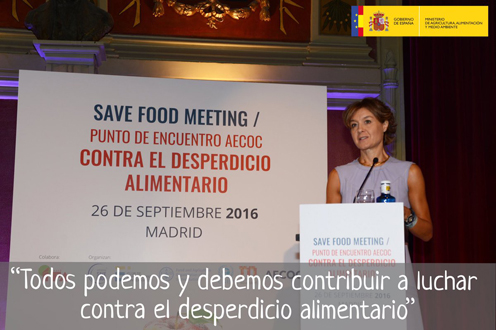On Monday, 26 September, at the opening of the Save Food 2016 meeting
"All of us can and should help avoid food waste", says Isabel García Tejerina
News - 2016.9.26
Isabel García Tejerina opened the Save Food 2016 meeting at the headquarters of Ateneo de Madrid on Monday morning. This initiative is being promoted by the Food and Agriculture Organization (FAO) to combat food waste around the world and is supported by the Club de Exportadores [Spanish Exporters' Club], the Asociación Española para la Codificación Comercial (AECOC) [Spanish Association for Commercial Coding] and Grupo IFA.
In her speech, Isabel García Tejerina said that one-third of global production (over 1.3 billion tonnes of food) goes to waste every year. The Spanish minister believes this is not only an ethical and nutritional problem but also an environmental one because scarce natural resources (water or land) are used and biodegradable waste is increasing, which do not help the fight against climate change.
More food, less waste strategy
Against this backdrop, the minister said that Spain is the sixth leading European country to waste the most food (approximately 7.7 million tonnes according to European Commission estimates).
Nonetheless, Spain has been one of the countries to respond to this situation the fastest and most effectively. Hence, the Ministry of Agriculture, Food and Environmental Affairs adopted its "More Food, Less Waste" Strategy in 2013 with a view to developing actions by all stakeholders in the food chain and the public authorities in a more organised, coordinated and structured fashion.
Isabel García Tejerina explained that this strategy aims to provide information on where, how much, how and why food loss occurs in order to implement awareness actions and best practices.
She also said that specific studies conducted in this field to date have allowed work to be done on a statistical model to quantify the waste and design tools for conducting audits on food industries, as well as to measure the waste from school canteens and work centres.
As regards domestic food waste, Isabel García Tejerina underlined the implementation in 2014 of a pioneering initiative in Europe - the "Domestic Food Waste Quantification Panel", which defines the products and amounts wasted in this area.
The Spanish minister explained that knowing where losses are occurring has enabled the design of a catalogue of initiatives for all links in the food chain. To this end, practical guidelines have been drawn up for retail traders in the fruit and vegetable sector (the sector generating the most waste) and consumer guidelines have been created, with ten keys to reducing waste based on such concepts as planning, responsible shopping, proper conservation and optimal use.
In this regard, Isabel García Tejerina stressed that there are three words that consumers should never forget: reduce, re-use and recycle, the so-called "Three Rs".
Isabel García Tejerina highlighted the field of education in particular, for which a series of guidelines have been created that contain actions to be implemented in the classroom, in the canteen and that also involve parents.
Raising awareness about the strategy
To raise awareness about the targets of this strategy, a number of themed weeks have been organised for consumers and the media, contact with distribution managers has been strengthened and a monthly newsletter has been launched. Furthermore, the Spanish minister announced that a specific website on this topic will be launched soon.
In short, "many actions that are already starting to produce results", she said. In fact, and according to the waste panel, waste was reduced by 2.3% in the period October 2015-March 2016 when compared with the same period of the previous year.
Against this backdrop, Isabel García Tejerina highlighted the initiatives by her ministerial department at the Milan Expo to foster projects by organisations, institutions and companies. She also mentioned the support being provided to private initiatives, such as the AECOC's programme entitled La alimentación no tiene desperdicio, aprovéchala [No need to waste food, use it].
Finally, the Spanish minister stressed that the Save Food meeting is "another very important step in the task of debate, awareness and collaboration between managers in the public and private sector on an issue of fundamental importance to our economy, our environment and our health".





